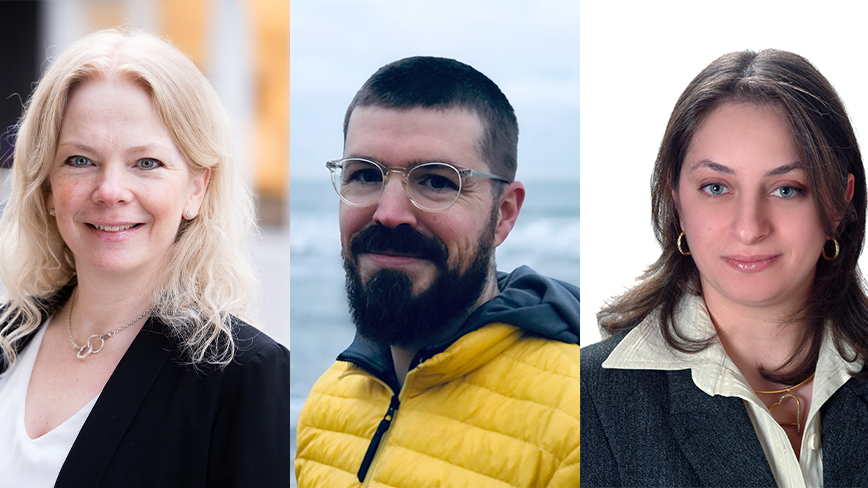They work with equality, diversity and equal treatment (JML) at EECS
"I want to look at the kind of environment we are creating at EECS and how it can be more welcoming”

We spoke with Elizabeth All, Dena Hussain and Rob Comber, who work together on equality, diversity and equal treatment at EECS. Read more about what the JML group does, how they intend to work with the issue and why they think this is important.
JML at EECS
The JML group will monitor developments in the area propose measures, activities and follow-up to the school's business plan. They will also talk to heads of departments to support their work with JML issues.
The departments must work actively to integrate the JML issues into the operations. For example, JML should be a standing item at every meeting with department management councils. They should submit a report of their JML work to the JML group twice a year.
A natural part of the school's activities
Elizabeth All, HR manager at the school and a member of the JML group, says:
"Although the JML group works actively with these issues, it is also essential that everyone is involved and contributes to this work and takes responsibility. Our employee survey showed that too many at our school have felt vulnerable. You must report if you see something or are exposed to something yourself! We can then tackle the problem and ensure that it does not happen again."
"The JML work will be a natural part of the school's activities; it will, for example, be addressed at the departments and included in the Business Plan for 2022," Elizabeth concludes.
We also spoke with Dena Hussain and Rob Comber, who represent their respective institutions in the group.
Rob, in what capacity are you part of the JML group?
"I am the representative for The Division of Media Technology and Interaction Design and The Department of Human-Centered Technology."
Dena, in what capacity are you part of the JML group?
"I am a faculty member in the Division of Computational Science and Technology."
Rob, why is this important you think?
"Across our education and employment we have a responsibility to create conditions that are not only equal for all to participate, but that provide additional support for those people who have typically been excluded or marginalized. We have a mandate to take active measures to support an inclusive and supportive education and employment, and I believe this is what the JML group has been tasked with and plans to do. The benefits to individuals and to society of inclusion are huge and the cost of not working towards inclusion is significant and long-lasting, even across generations. We at KTH need to work towards a more inclusive environment now and for the future."
Dena, these questions will be also be integrated to the departments, why is that important?
"Creating a diverse and inclusive working and learning environment at KTH is to create a sustainable balanced environment for all."
Rob, have you worked with these questions before?
"Yes! In my research I have looked at issues of inclusion and participation in work, public health, democracy, and in education. An important aspect has been to not only identify the problems in the system, but to also work with those who have not been included in the design of the system in the first place. This can take a lot of additional work and sometimes you find out you’ve been working on the wrong problem all along. The important part that comes out of that is valuing the different expertise people bring to the conversation."
Dena, what will be the group’s focus in the start?
"The group will focus on different aspects creating different goal, such as including gender diversity in regards to the recruitment strategies at KTH."
Rob, you have recently joined the group, what will you focus on initially?
"I would like to look at the kind of environment we are creating at EECS and how we can make it a more welcoming space. I’d like to make sure that we are finding ways to make people feel welcome, valued, and included. I think that starts from the very beginning, we need to learn and show students and each other how to do things like work in groups, give and receive feedback, and support each other in the work we do."
Dena, you have been working in academic environments in several countries, is working JML new for the industry and do different countries work differently?
"I have had the advantage of working in both the academic and cooperate environments in different parts of the world including England, Sweden and the Middle East, having the privilege of transferring and knowledge bridging experience. And I think that working towards diversity has gained more awareness over the past years but there is always room for improvement."
